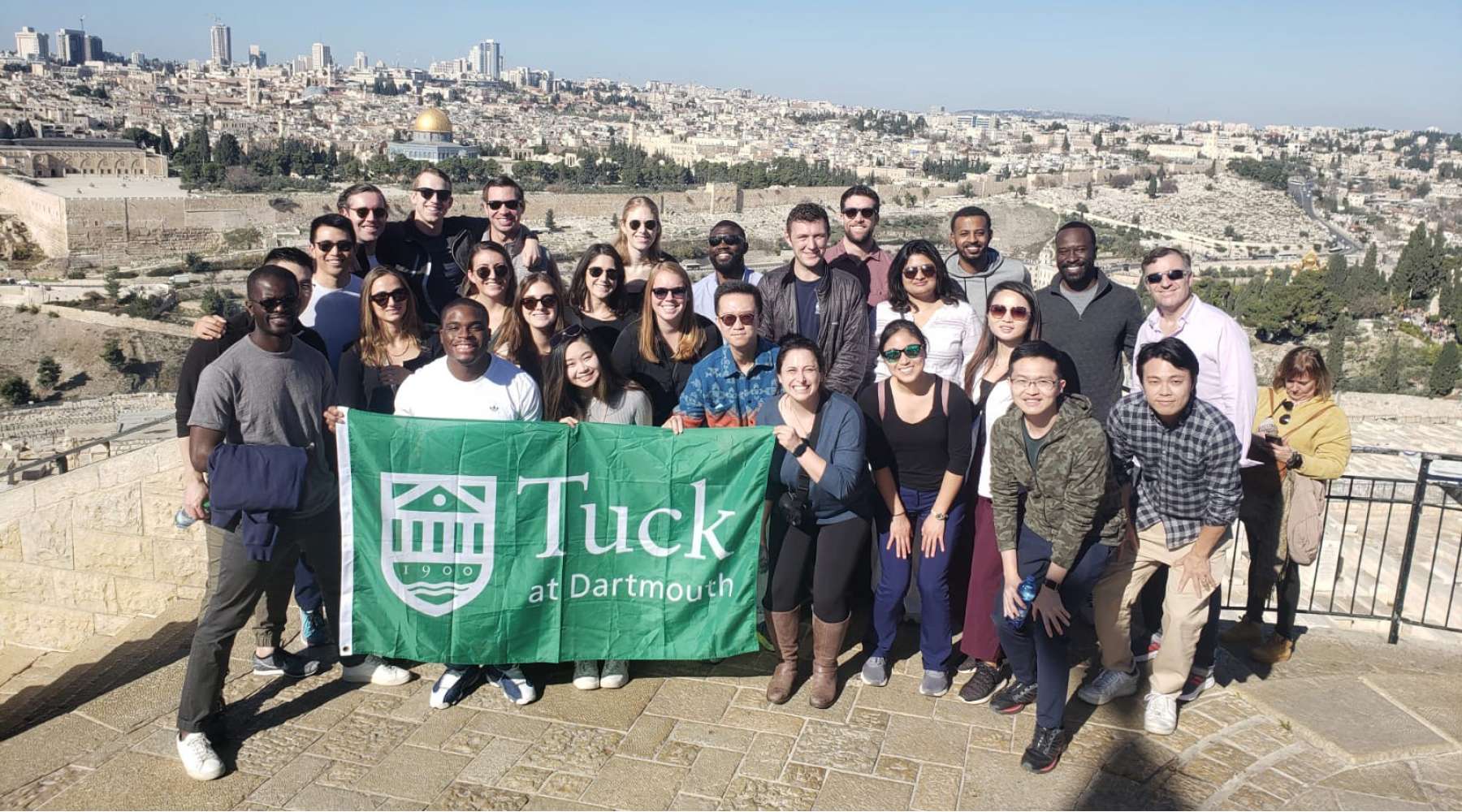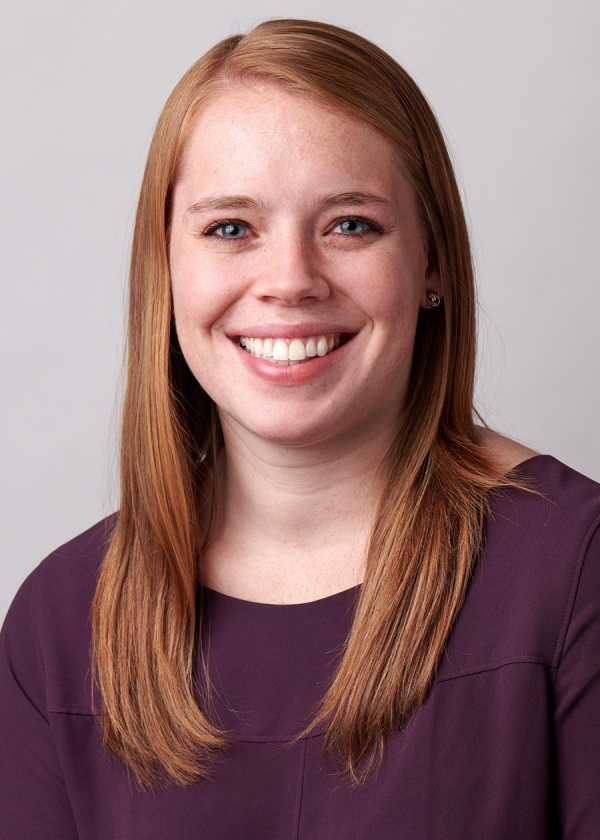
T’23s Alison Kadavy and Sherry Yang reflect on tech, entrepreneurship, and life lessons from the December 2022 GIX course in Israel.

Tuck’s Israel GIX is centered around technology and entrepreneurship in the “startup nation.” While this identity was acknowledged at every company visit, we also heard a candid view from one of our hosts about Israel functioning as a “scale-up nation” instead. Indeed, Israel’s startup businesses do not operate that differently from those in the U.S., ultimately trying to scale to achieve longevity. Rather it is other aspects of Israeli culture that underlie the country’s success in the tech industry. As I reflect on what I learned during my GIX, a few takeaways and ‘ah-ha’ moments come to mind.
Israel balances family and career through a “work hard, play hard” culture. Our company hosts alluded to the intense Israeli workplace culture which was subsequently balanced with the relaxation of the Shabbat dinner we attended. My previous view of working at tech companies, especially startups, carried the connotation that employees are effectively required to be “on” 24/7. Of course, not everyone we met practiced the same degree of disconnecting during the weekend, but I admire the culture of commitment I saw in Israel to both work and personal lives. The dedication to workplace success and personal fulfillment was an important reminder to value this balance in my own career.
Admitting and learning from one’s failures is an expectation. Every presenter showed a genuine willingness to share and embrace their past mistakes. I found this acknowledgment to be refreshing and unexpected. Today, buzzwords like “adaptability” and “comfort with ambiguity” are pervasive in the tech space, but not everyone can translate these words into action. We met Mariam, a female Bedouin founder who truly embodies these values, and whose story shed light on the different ways a business can be successful. Startups are often focused on their different growth paths and options to exit, but success truly is in the eye of the founder. Not all business goals need to be driven by profit and monetary return to shareholders. Staying true to a founder’s vision or giving back to a community, like Mariam does by employing other Bedouin women, are equally valid measures of success.
Corporate Social Responsibility (CSR) and business impact is a growing concern. Our visit with the head of impact & sustainability at Pitango Venture Capital surprised me with the revelation that CSR and DE&I initiatives are not considered prevalent in Israel. Our GIX itinerary exposed us to a broad range of companies, including the Palestinian Internship Program which works to integrate Palestinians into Israeli workplaces, but programs such as this are not common. I had never fully reflected on the idea that the U.S. might be more progressive in these areas. At Tuck, we are often pushed to consider what efforts we can make in our own careers to push for more accountability in the CSR space. These company visits informed my role as a future business leader and my responsibility to raise these important topics both in the Tuck classrooms and my workplace.
My GIX was knowledge-filled and left me wanting to learn more about Israel. I now stay up to date on everything happening there as it relates to business, politics, culture, and, of course, the food scene! It is undoubtedly a cornerstone of my Tuck experience.
Alison is from Seattle, WA and attended Stanford University where she majored in human biology and French. Prior to Tuck, Alison worked at Roku in New York City in Audience Development and Account Management roles. In addition to being a lover of all things streaming TV-related, Alison enjoys running, crosswords, Broadway tunes, and Taco Tuesdays. After Tuck, she plans to join the tech industry as a product manager at Amazon.

Starting our journey at Yad Vashem and Old Jerusalem anchored me to the struggles and challenges the Jewish people endured to be where they are today. I was in awe of Yad Vashem’s mission to identify all the missing names because retrieving the names of the lost ones reveals a part of their identity and allows us to remember them with more context. It was tremendously impactful to hear about the silver linings, leadership, willpower, and resilience individuals had during such a grim time. I left the museum feeling Hatikvah (hope) much like what the Israel National Anthem instills (also called Hatikvah). Old Jerusalem to me was an extremely memorable experience. I knew Jerusalem had strong religious roots across multiple religions but the magnitude of the graves on the Mount of Olives facing the Temple Mount and the density of religions in the Church of the Holy Sepulchre was a humbling experience.
One of the most memorable parts of the trip for me was visiting Masada. Learning about the tragic death of 960 Jews, the method of suicide, and learning about their courage to take their own life instead of surrendering struck me. It once again helped me understand why Israelis are the way they are individuals growing up oathing “Masada shall not fall again” when they join the Israeli Defense Forces, individuals with a dedication to their country, and individuals with an incredible drive to succeed. Israel’s fight for sovereignty is also evident in the various historical conflicts over land (such as the West Bank and Gaza with Jordan and Egypt respectively) and its current challenges with Palestine. As a result of this historical and religious backdrop, it explains the cross-cultural differences—the straight-forward, go-getter attitudes, the restaurants not needing reservations, etc.
Overall, I felt that the Israel GIX experience was incredibly enriching. The thoroughness and intentionality of the trip planning, starting from Yad Vashem and Jerusalem to provide the historical and religious context to our incredible guide, Oran, the great team of students, and the trip leaders Adam and Vincent, I couldn’t have asked for a better GIX experience. I’ve always wanted to learn and travel to Israel given its intersection and importance in religion, history, and entrepreneurship. The GIX gave me a great starting point for understanding Israel more. It provided me with the understanding and motivation to dive deeper into this soon-to-be scale-up nation. I think what struck me most on this trip is the drive, passion, and relentless pursuit—aka chutzpah—Israelis possess. These are all essential characteristics of successful entrepreneurs and I have no doubt Israeli will soon become the scale-up nation it aims to be, given enough resources and capital.
Prior to Tuck, Sherry worked in the healthcare industry focused on drug licensing, consulting, and executing market entrance strategies in the U.S. and emerging markets to reshape the perceptions of cannabis as a consumer retail product. Sherry received her Bachelor of Health Sciences and a Master’s in Biomedical Discovery and Commercialization from McMaster University (Canada). At Tuck, she is a Healthcare Fellow, PEVC Fellow, Next50 Fellow, TVSF Director, ASW and WIBC co-chair, ABC co-chair, and loves making macarons, yoga, and dancing.
Global Insight Expeditions (GIXs) help students develop cultural awareness, empathy for the thoughts and attitudes of local people, and agility to adapt their behavior to successfully navigate different business environments through structured reflection. Each course begins with classroom sessions on Tuck’s campus. Students then travel with one or two faculty members where they engage with corporate leaders, entrepreneurs, community leaders, government officials, and local people from different walks of life.